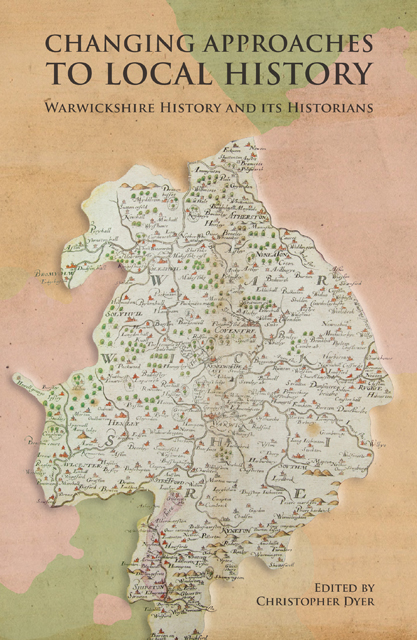Book contents
- Frontmatter
- Contents
- List of Illustrations
- Notes on Contributors
- Foreword
- Acknowledgements
- List of Abbreviations
- Introduction
- 1 The Dugdale Society: Its First Hundred Years
- 2 The Beginnings of Coventry
- 3 Was Commerce in Late Medieval Coventry Restricted by Regulation?
- 4 Studying Late Medieval Small Towns in Warwickshire 1920–2020
- 5 Rural Warwickshire in the Middle Ages: Society and Landscape
- 6 Religion, Rebellion and Red Jackets: Changing Approaches to Society and Politics in Sixteenth-century Warwickshire
- 7 Social Networks, Intellectual Affinities and Communal Harmony in Post-Reformation Warwickshire
- 8 Discovering Warwickshire’s Vernacular Architecture
- 9 Local History and the English Civil War: A View from Warwickshire
- 10 Writing Histories of the Landed Elite in Georgian Warwickshire
- 11 The Victoria County History in Warwickshire
- 12 Writing Women into the Political History of Warwickshire
- 13 Shakespeare and the Warwickshire Landscape in the Age of the Tourist
- Conclusion
- Index
11 - The Victoria County History in Warwickshire
Published online by Cambridge University Press: 17 December 2022
- Frontmatter
- Contents
- List of Illustrations
- Notes on Contributors
- Foreword
- Acknowledgements
- List of Abbreviations
- Introduction
- 1 The Dugdale Society: Its First Hundred Years
- 2 The Beginnings of Coventry
- 3 Was Commerce in Late Medieval Coventry Restricted by Regulation?
- 4 Studying Late Medieval Small Towns in Warwickshire 1920–2020
- 5 Rural Warwickshire in the Middle Ages: Society and Landscape
- 6 Religion, Rebellion and Red Jackets: Changing Approaches to Society and Politics in Sixteenth-century Warwickshire
- 7 Social Networks, Intellectual Affinities and Communal Harmony in Post-Reformation Warwickshire
- 8 Discovering Warwickshire’s Vernacular Architecture
- 9 Local History and the English Civil War: A View from Warwickshire
- 10 Writing Histories of the Landed Elite in Georgian Warwickshire
- 11 The Victoria County History in Warwickshire
- 12 Writing Women into the Political History of Warwickshire
- 13 Shakespeare and the Warwickshire Landscape in the Age of the Tourist
- Conclusion
- Index
Summary
The Victoria County History (VCH) was founded in 1899 as a private enterprise sponsored by the publishing company Archibald Constable & Co. It was designed to be a scheme for ‘the compilation of a history of each county of England’. The expectation was that over time it would become a collective account of the localities amounting to ‘a National Survey … tracing … the story of England’s growth … into a nation which is now [in 1899] the greatest on the globe’. Arthur Doubleday, the first editor, persuaded the marquess of Lorne to solicit the personal approval of Queen Victoria. Lorne was Queen Victoria’s son-in-law. As a result, the ‘big red books’ were dedicated to her memory, and the present monarch, Queen Elizabeth II, renewed that association. Since 2012 new volumes have been dedicated to her. VCH Warwickshire was completed in 1969. This chapter looks at its setting up, research and writing, and completion. It ends with a reflection on the influence of the VCH on the history of the county.
Origins
The VCH was founded in 1899 and sponsored by Constables through one of its directors, H. Arthur Doubleday. The original scheme envisaged for each county two volumes of general essays guiding the reader through the most up-to-date research, at that time, and two volumes of topographical studies. The four volumes made a ‘set’ in the terminology used by the VCH. The topographical volumes were intended to complement the general volumes, not simply to be parish studies. To run the VCH a General Committee was established in London, and a county committee was set up for each county.
It says a good deal for the thinking of the publisher that the county committee was designed to be chaired by the lord lieutenant and to include peers, bishops, gentlemen and justices of the peace (JPs). As was his normal practice, Arthur Doubleday approached the Lord Lieutenant of Warwickshire, Lord Leigh, with a view to persuading him to take the chair of the county committee. He was blunt and to the point: ‘in connection with the Victoria History of the Counties of England, it is proposed to form in each County a Committee for the purpose of obtaining the interest and influence of those who have information or documents which if made available, would largely help in the work’.
- Type
- Chapter
- Information
- Publisher: Boydell & BrewerPrint publication year: 2022



